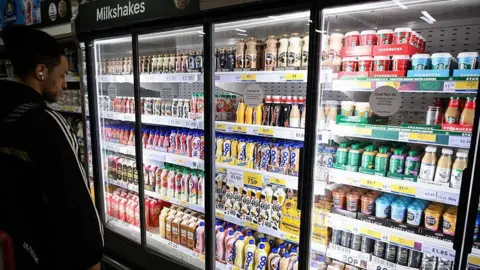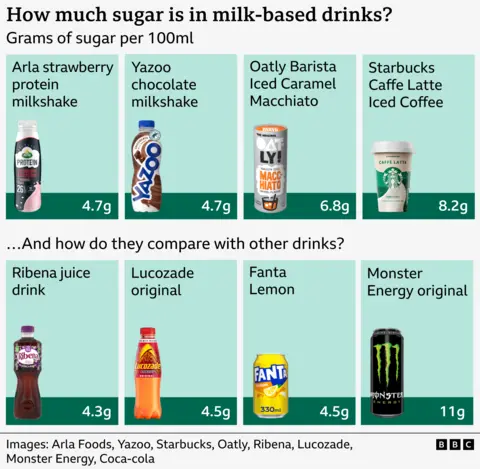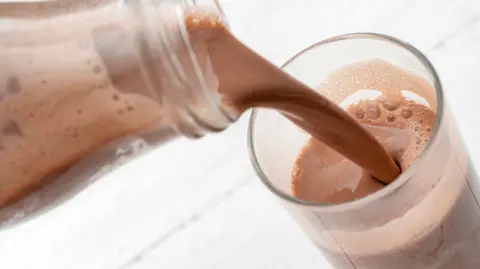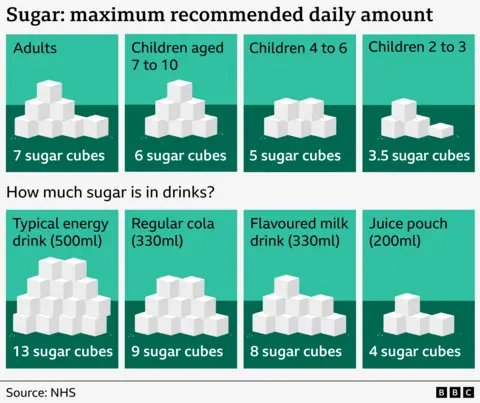 Getty Images
Getty ImagesMilkshakes, coffee drinks and milk alternatives will be included in the government's sugar tax scheme for the first time in the UK in a new bid to help tackle obesity.
The sugar levy, officially known as the Soft Drinks Industry Levy (SDIL), is a tax on packaged drinks, such as those sold in cans and cartons in supermarkets.
Health and Social Care Secretary Wes Streeting announced the extension to the levy in the House of Commons on Tuesday ahead of Budget.
How will it work?
The sugar tax will be extended to milk-based drinks from 1 January 2028.
The government says companies making these drinks will have to cut the amount of sugar they contain or face taxes.
This means they may either taste different (less sweet) or cost a little more.
The tax was introduced by the Conservative government in April 2018 as a means to make diets healthier and tackle obesity by reducing sugar consumption.
In making the announcement, the Health Secretary said: “Obesity deprives children of the best start in life, hits the poorest people hardest, creates lifelong health problems for them and costs the NHS billions.”
What drinks are included?
The sugar tax applies to packaged soft drinks with added sugar.
This already applies to most sugary and carbonated soft drinks sold in cans, bottles and cartons in supermarkets.
This will now also apply to packaged milk-based drinks with added sugar, such as bottled milkshakes and coffee drinks.
It will now also cover milk alternatives – plant-based drinks such as soy, oat and rice milks with added sugar.
Milk-based drinks are exempt from the sugar tax because they contain calcium, which is welcome in the diets of children and young people.
However, the high sugar content of some milk-based drinks means the government has withdrawn this exemption.

The government will introduce a “lactose standard” to account for the natural sugar in the milk contained in these drinks.
All milk alternative drinks, such as soy, almond or oat drinks, were previously exempt from the sugar tax if they contained 120mg of calcium per 100ml.
But if these drinks contain added sugar beyond the sugar derived from the main ingredient, they will now be taxed.
 Getty Images
Getty ImagesWhat drinks are not included?
The sugar tax does not apply to drinks prepared and served in cafes, restaurants and bars. Therefore, coffee, lattes and other dairy drinks prepared in cafes will not be subject to this tax.
Soft drinks made with only natural sugars, such as cow's milk and pure fruit juice, are also exempt.
Unsweetened plant milk is also not included.
Non-alcoholic beer or wine, baby food, drinks sold in powder form, and cocktails or soft drinks served in open containers are also exempt from the sugar tax.
How much do companies pay?
The tax is currently levied at 19.4p per liter for drinks containing at least 5g of total sugar per 100ml, and 25.9p per liter for drinks with 8g of sugar or more.
But the government is lowering the maximum amount of sugar allowed in drinks. Instead of 5g, the limit will now be 4.5g per 100ml.
What impact did the sugar tax have?
This has led to a 46% reduction in sugar content in soft drinks to date, according to the government.
Almost 90% of the market now contains less sugar than the level at which the tax applies.
But experts say there is still too much sugar in the British diet.
Current UK guidelines recommend that free sugars should make up no more than 5% of your daily energy intake.
But the amount of sugar consumed in the UK is around double that. Obesity rates among children and adults also show no sign of falling, with almost two thirds of people in the UK being overweight or obese.
This is what prompted the government to revise the tax and extend it to milk-based drinks.
How much sugar do children consume?

The average intake of free sugar for children aged 1.5 to 3 years is 45 g per day (about 11 sugar cubes).
For children 4–10 years old, this is 55 g per day, and for teenagers 11–18 years old, it is 70 g per day (17 sugar cubes), according to Latest National Diet and Nutrition Survey.
Less than a third of children under three years of age meet the recommended intake of free sugar.
Fruit juices and smoothies account for 12% of free sugar consumed by the youngest children and 15% in the 4-10 age group.
National Health Service Council says adults should consume no more than 30g of free sugar per day (equivalent to 7 sugar cubes), and children should consume much less (no more than 3 cubes for children 2-3 years old). There are different recommended limits for children of different ages.









